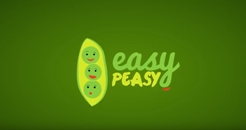 EasyPeasy - learning through play, every day
EasyPeasy - learning through play, every day
Nearly half of children arrive at school ‘not ready to learn’ because they lack basic skills like self control, concentration, and being able to get on with classmates. For children on Free Schools Meals it's 2 in 3. This makes it much harder for teachers to teach, but even more importantly it leads to big inequalities in education and in children’s futures.
EasyPeasy is an app for parents to use that supports learning through play at home, helping children develop the skills they need for school, and beyond. Parents receive games modelled by real families in short film clips and information and advice on child development. All games in the app align to the Early Years Foundation Stage curriculum.
The app was developed in partnership by Oxford University, Sutton Trust, Emerge Education, Design Council and EdSpace.
Independent evidence shows significant improvement in school readiness skills. Children develop key skills like concentration, creativity, and determination through purposeful play and through positive interactions with their parents.
Althugh aimed at schools, this app could easily be adopted by churches as they reach out to local parents of pre-school chiildren. You choose families in your community that you are in contact with and who you think can benefit from EasyPeasy. This forms a 'pod' of parents. Parents get to know each other through commenting and sharing experiences of playing the games. You receive email reports on parent engagement and so can encourage, etc.
See parents discussing EasyPeasy here:
What is the impact?
EasyPeasy measured the impact of the app on parents and children through a rigorous randomised controlled trial conducted independently by the University of Oxford’s Department of Education, in partnership with Sutton Trust, Esmée Fairbairn Foundation and Bournemouth Borough Council.
During the study, local parents in Bournemouth received weekly game ideas to play with their children, modelled by real families and accompanied tips and guidance. Each game promotes positive parent-child interaction and focuses on building skills outlined in the statutory Early Years Foundation Stage Framework (EYFS) including ‘self-regulation’ and associated capabilities like delaying gratification, concentration, attentional focus, and listening, all of which strongly underpin children’s learning in the classroom.
Standardised tests were used that assess aspects of parent behaviour and child development. Of the aspects measured, it that found that two of them had actually changed as a consequence of experiencing the app, using it, and playing with the child:
-
Parent discipline and boundaries: parents feeling more comfortable setting limits for behaviour and following through on expectations. This measure is not a measure of parental aggression or harsh discipline, focusing instead on reasoning with the child and finding positive ways to avoid conflict.
-
Child cognitive self-regulation: persisting to complete difficult tasks (rather than giving in to distractions or giving up), making decisions independently, and working things out for oneself. This is sometimes called ‘grit’ or ‘character’.
Some quotes from families who took part in the trial:
“I've tried this with my goddaughter. She loved the challenge of understanding my instructions and jumping onto the right and sometimes wrong shapes!! I gave her lots of positive encouragement and praise as we played the game.” Carer commenting on 'Stepping Stones'
“Wow! I can't believe how much fun this was as it developed and how clever my little girl actually is. Such amazing imagination. Thank you for opening my eyes. She loved it” Parent commenting on 'Imaginary Safari'
“Oh my goodness!!!. I really like selfies game. We used and learn new vocabulary and so surprise how well my daughter can read emotions, much better than myself!!. I found this app very handy to keep the kids entertained and get to spend time together.” Parent commenting on 'Selfies'
Why not set your parent and toddler group up as a pod and ask them to get their friends to come on board as well?
UPDATE JULY 2019:
Today the Education Endowment Foundation publishes the results of EasyPeasy’s third randomised control trial. The study built upon two earlier efficacy studies, commissioned by the Sutton Trust and led by Professor Kathy Sylva at the University of Oxford in 2016 & 2017. These studies yielded nearly identical outcomes, showing how children who learned and played with EasyPeasy for a period of 10-18 weeks made 5 months of additional progress against their peers in an area called ‘Cognitive self-regulation’, in other words, the ability to sit and focus on a task. Professor Kathy Sylva has described Cognitive Self-Regulation as ‘crucial for school readiness’ and it is widely understood to underpin academic success.
The study published today will highlight replication of EasyPeasy’s impact on Cognitive Self-Regulation for a third time, this time based on the direct reports of teachers. It will also show how parents reported that EasyPeasy had a statistically significant impact on a wide range of factors that improved the quality of their Home Environments including generating more Language and Academic Stimulation (effect sizes 0.5, 0.45), and helping parents become more Responsive and Interactive with their children (effect sizes 0.59, 0.72).The influence of parents, and the quality and quantity of interactions they have with their children, is the strongest predictor of children’s development by the time they start school, stronger still than the quality of their nursery care.
The study also showed that children improved their ability to understand Concepts and Follow Directions as well as understanding how words fit together to make up sentences (‘Word Structure’), putting them one month ahead of their peers at an age when one month is a not insignificant proportion of a young child’s life. These findings were based on direct observation of children through tests administered by Research Assistants.
See article here.
Retweet about this article:
Geoff Knott, 06/12/2016